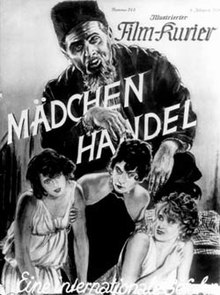| White Slave Traffic | |
|---|---|
 | |
| Directed by | Jaap Speyer |
| Written by | |
| Starring | |
| Cinematography | Paul Holzki |
| Music by | Hans May |
Production company | Liberty-Film |
| Distributed by | Süd-Film |
Release date |
|
| Country | Germany |
| Languages | |
White Slave Traffic ( German: Mädchenhandel – Eine internationale Gefahr) is a 1926 German silent thriller film directed by Jaap Speyer and starring Rudolf Klein-Rogge, Erich Kaiser-Titz, and Fritz Alberti. When a Berlin nightclub worker moves to Budapest to take up a job that has been arranged for her, she finds herself being kidnapped by white slave traffickers. She is eventually rescued from a brothel in Athens. The film opened with a warning from a group committed to combating white slavery, but the film's sensationalist tone provoked controversy. In Britain it was refused a licence by the British Board of Film Censors although it is possible it had some private screenings. One contemporary review described it as a "crude melodrama on an unpleasant subject". [1]
Cast
- Rudolf Klein-Rogge as Simpat Karamanian, Arut Akkunian, ein deutscher Professor, ein asiatischer Hausierer und Dr. Papamarkos
- Erich Kaiser-Titz as Polizeihauptmann von Budapest
- Fritz Alberti as Justizminister
- Charles Lincoln as Geza Farkacz
- Wera Engels as Irene Wendtland
- Frau Szlikay as Frau Generalin von Dingolstaedt
- Trude Hesterberg as Meta Pohlmann
- Mary Kid as Ida Schulz
- Wilhelm Diegelmann as Vater Schulz
- Sophie Pagay as Mutter Schulz
- Paul Rehkopf as Sylviani
- Mira Hildebrand as Margarete
- Kurt Gerron as Direktor des Purpur-Paradieses
- Maria Forescu as Eine menschenfreundliche Frau
- Mia Pankau as Aranka von Erdödyi
References
Bibliography
- Robertson, James Crighton (1993). The Hidden Cinema: British Film Censorship in Action, 1913–1975. London: Routledge. ISBN 978-0-415-09034-6.
External links
- 1926 films
- 1920s thriller films
- German thriller films
- Films of the Weimar Republic
- German silent feature films
- Films directed by Jaap Speyer
- Films set in Berlin
- Films set in Budapest
- Films set in Athens
- Films about prostitution in Greece
- German black-and-white films
- Silent thriller films
- 1920s German films
- Films scored by Hans May
- Silent German film stubs
- Thriller film stubs
| White Slave Traffic | |
|---|---|
 | |
| Directed by | Jaap Speyer |
| Written by | |
| Starring | |
| Cinematography | Paul Holzki |
| Music by | Hans May |
Production company | Liberty-Film |
| Distributed by | Süd-Film |
Release date |
|
| Country | Germany |
| Languages | |
White Slave Traffic ( German: Mädchenhandel – Eine internationale Gefahr) is a 1926 German silent thriller film directed by Jaap Speyer and starring Rudolf Klein-Rogge, Erich Kaiser-Titz, and Fritz Alberti. When a Berlin nightclub worker moves to Budapest to take up a job that has been arranged for her, she finds herself being kidnapped by white slave traffickers. She is eventually rescued from a brothel in Athens. The film opened with a warning from a group committed to combating white slavery, but the film's sensationalist tone provoked controversy. In Britain it was refused a licence by the British Board of Film Censors although it is possible it had some private screenings. One contemporary review described it as a "crude melodrama on an unpleasant subject". [1]
Cast
- Rudolf Klein-Rogge as Simpat Karamanian, Arut Akkunian, ein deutscher Professor, ein asiatischer Hausierer und Dr. Papamarkos
- Erich Kaiser-Titz as Polizeihauptmann von Budapest
- Fritz Alberti as Justizminister
- Charles Lincoln as Geza Farkacz
- Wera Engels as Irene Wendtland
- Frau Szlikay as Frau Generalin von Dingolstaedt
- Trude Hesterberg as Meta Pohlmann
- Mary Kid as Ida Schulz
- Wilhelm Diegelmann as Vater Schulz
- Sophie Pagay as Mutter Schulz
- Paul Rehkopf as Sylviani
- Mira Hildebrand as Margarete
- Kurt Gerron as Direktor des Purpur-Paradieses
- Maria Forescu as Eine menschenfreundliche Frau
- Mia Pankau as Aranka von Erdödyi
References
Bibliography
- Robertson, James Crighton (1993). The Hidden Cinema: British Film Censorship in Action, 1913–1975. London: Routledge. ISBN 978-0-415-09034-6.
External links
- 1926 films
- 1920s thriller films
- German thriller films
- Films of the Weimar Republic
- German silent feature films
- Films directed by Jaap Speyer
- Films set in Berlin
- Films set in Budapest
- Films set in Athens
- Films about prostitution in Greece
- German black-and-white films
- Silent thriller films
- 1920s German films
- Films scored by Hans May
- Silent German film stubs
- Thriller film stubs